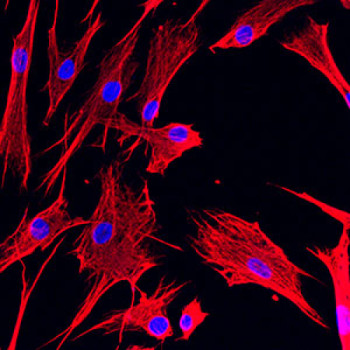Tag Archives: william
Potential route to bladder cancer diagnostics, treatments — ScienceDaily
source : http://www.sciencedaily.com/releases/2014/02/140211174807.htm
Team discovers key mechanisms to inhibit triple negative breast cancers
“In previous findings published over the past 10 years, our teams have described key mechanisms in these critical proteins,” said Khalid Sossey-Alaoui, PhD, Department of Molecular Cardiology, Lerner Research Institute, Cleveland Clinic. “A key component in the deadly metastatic potential of TNBC tumors is that they spread through tissues outside the breast very quickly. The two proteins that we studied, WAVE3 and TGF-β, when together, promote tumor aggressiveness.” “We found important biological implications,” said William Schiemann, PhD, an associate professor, Division of General Medical Sciences-Oncology, Case Western Reserve School of Medicine, and co-leader of the Breast Cancer Program at the Case Comprehensive Cancer Center…
Simple test can indicate cervical cancer
The team, led by Nichola Garbett, Ph.D., published its findings online today in PLOS ONE. …
AML score combining genetic, epigenetic changes might help guide therapy
The findings, published in the Journal of Clinical Oncology, come from a study led by researchers at The Ohio State University Comprehensive Cancer Center — Arthur G. James Cancer Hospital and Richard J. Solove Research Institute (OSUCCC — James)…
Fatigue, a common side effect of breast cancer treatment, evaluated in novel patient study
"Understanding who is at risk for post-treatment fatigue, and why, is the first critical step in the development of personalized, targeted interventions for the treatment and prevention of breast cancer-related fatigue," said Arash Asher, MD, director of cancer rehabilitation and survivorship at the Cedars-Sinai Samuel Oschin Comprehensive Cancer Institute and the medical center’s primary investigator on the study. …
Potential new drug effective in breast cancer, melanoma resistant to targeted therapies
In many cancers, a tumor suppressor protein called retinoblastoma is deactivated because of an increase in the activity of the proteins CDK 4 and 6. …
Multivitamins with minerals may protect older women with invasive breast cancer
"Our study offers tentative but intriguing evidence that multivitamin/mineral supplements may help older women who develop invasive breast cancer survive their disease," said Sylvia Wassertheil-Smoller, Ph.D., lead author of the study and distinguished university professor emerita of epidemiology and population health at Albert Einstein College of Medicine of Yeshiva University. Multivitamin/mineral supplements are the most commonly consumed dietary supplements among U.S. adults. They usually contain 20-30 vitamins and minerals, often at levels of 100 percent of U.S…
New method for tracking cell signaling
The technique, named cell type specific labeling using amino acid precursors (CTAP), exploits the inability of vertebrate cells to synthesize essential amino acids normally required for growth and homeostasis. The research was published online in the journal Nature Methods on June 30, 2013. This technological advance will provide investigators with a new tool for comprehensive mapping of cell-cell communication, which is important in all aspects of cancer development, maintenance, and response to therapy. For example, this method could be used to study cell signaling events between normal and malignant cells in order to better understand the molecular mechanisms by which surrounding normal cells alter tumor growth and response to treatment…
New method for mapping the protein signals between healthy and diseased cells
The technique, named cell type specific labeling using amino acid precursors (CTAP), exploits the inability of vertebrate cells to synthesize essential amino acids normally required for growth and homeostasis. A team headed by Dr. Nicholas Gauthier and Dr. …
